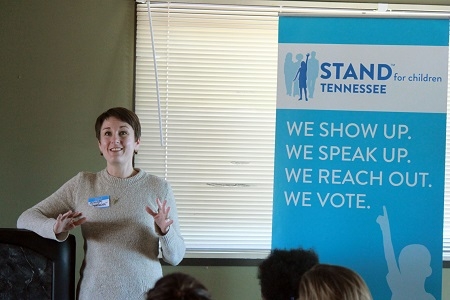As Stand for Children celebrates 20 years as an organization, hear from one of our awesome parent leaders, Ginger Spickler, on how joining and being involved with Stand has impacted her life.
I first got involved in Stand during the Memphis City School charter surrender issue, as a way of learning more about why that was happening and what it would mean for our schools. Stand provided not only education on the issue, but provided training on how to make my voice heard during the charter surrender and the Transition Planning Commission’s work immediately after. It was incredibly empowering.
One of the best opportunities Stand afforded me was serving as a facilitator in several Stand UP (University for Parents) courses. I was able to share a lot of what I’d learned about how education works, how we can best support our kids in school, and how we can use our voices as parents to fight for better opportunities for them. It was so rewarding to see parents come back week after week for the class (not for my fabulous facilitating, I know!), but because they were learning so much from each other and feeling more empowered week after week.
I was able to share a lot of what I’d learned about how education works, how we can best support our kids in school, and how we can use our voices as parents to fight for better opportunities for them.
Since joining Stand, I have gained a great deal of confidence in being able to speak up about the education issues that affect Memphis children. I even started a website called Memphis School Guide that serves as a resource to parents about how to find the right school for their children. Being a member of Stand definitely helped give me the knowledge and confidence I needed to take on that challenge. I’ve also met people from throughout our community who I may never have crossed paths with otherwise, but who also have similar concerns about the quality of education their children are getting, and how we might do better by them.
I’m a member of Stand because I have concerns about education in Memphis and beyond, and I believe that Stand for Children has been one of the strongest forces locally for organizing parents and other stakeholders to represent the best interests of kids. As a parent, I see firsthand how challenges in our schools impact my own children and the others they go to school with. We can complain about those challenges, or we can try to make them better—Stand helps me do the latter.
For more information on how you can get involved with Stand, visit www.stand.org/Tennessee.






